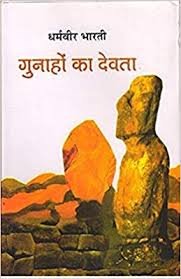Gunahon Ka Devta

Rating: 4.3/5
Author: Dharamvir Bharati
Publisher: Bhartiya Jnanpith
Publishing Date: 1949
Language: Hindi
Genre: Domestic Fiction
ISBN-10: 9326352021
ISBN-13: 978-9326352024
Format: Paperback
Pages: 258
Plot:
The novel tells the passionate love story of Chander and Sudha and is set in Allahabad just after Partition. Chandrakumar Kapoor ‘Chander’, an orphan, is a young researcher and has a mentor named Dr. Shukla, a widower, and a professor. Chander is close to Sudha, Dr. Shukla's daughter. The two share a relationship that is deep and strong and their attraction for each other increases with the passage of time.
Sudha falls in love with Chander and this becomes clear to Sudha's best friend ‘Gesu’ and Sudha's cousin ‘Binti’. Chander is from a lower caste than Sudha, and so he hesitates to ask for Sudha's hand in marriage from her father. While Sudha seems to be fairly 'modern', she cannot stand up to the social pressure of having to agree to marry the man of her father's choice. Chander also forces her to abide by the wishes of her father.
It is primarily the story of the romance between two characters (Chandar and Sudha) in the backdrop of urban middle-class, pre-independence India.
Review:
This novel was written at a time when Indians were moving from colonialism to independence but were still guided by the conditioned atavistic ideologies in the country.
Gunahon Ka Devta’ was path-breaking as it was the first Hindi novel that honestly talked about ‘tabooed subjects’ like sexuality, caste, and religious discrimination. The book boldly questioned the topic of sex in love, a controversial topic that resonated deeply with the youth of that time.
In the novel’s foreword, the author says:
"While writing this novel I experienced the feeling one has during depressing moments when he prays fervently, with full faith.... It appears as if the very same prayer has been ingrained in my heart and I am still repeating it..."
The writer uses this love story to expose the vast socioeconomic division in society. Bharati highlights the hypocritical nature of the people: On one hand, the children are taught to learn the values of the society they are born in but on the other hand, they are judged on their freedom to make their own choices that go slightly above the laid expectations.
The character ‘Chander’ believes that the best way to deal with a woman is to treat her like an idol and not touch her. It proves him wrong in every way possible and in the end, he finds himself standing alone. This is a subject of a conservative mindset and those who are ignorant to adapt to something new will have to face the dreadful consequences of their stubborn choices in life.
It is psychologically damaging to have such regressive mentalities, to keep following those ideals. In those moments, resistance against such ideas becomes the only way to make way for more progressive values and which are for the betterment of society.
Adaptations:
- In 2015, Garima Productions produced a television adaptation of the novel. The show was titled ‘Ek tha Chander Ek thi Sudha’ aired on Life OK and became available on web portal Hotstar. The show starred actor Rahil Azim and Umang Jain in lead roles.
About the Author:
Dharmaveer Bharti (25th December 1926 – 9th September 1949) was a prominent writer, poet, playwright, and social thinker of modern Hindi literature. He was also the editor-in-chief of the once-famous weekly magazine Dharmayuga.
Bharati was awarded the Padma Shree for literature in 1972 by the Government of India. Kanupriya, Thanda Loha, Saat Geet Varsh, Sapana Abhi Bhi and Toota Pahiya are amongst his most popular works of poetry. His novel ‘Gunahon ka devta’ became a classic. Bharati's ‘Suraj ka satwan Ghoda’ is considered a unique experiment in storytelling and was made into a National award-winning movie in 1992 by Shyam Benegal. Andha yug, a play set immediately after the Mahabharata war, is a classic that is frequently performed in public by drama groups.
He was awarded the Sangeet Natak Akademi Award in Playwriting (Hindi) in 1988, given by Sangeet Natak Akademi, India's National Academy of Music, Dance and Drama.















































